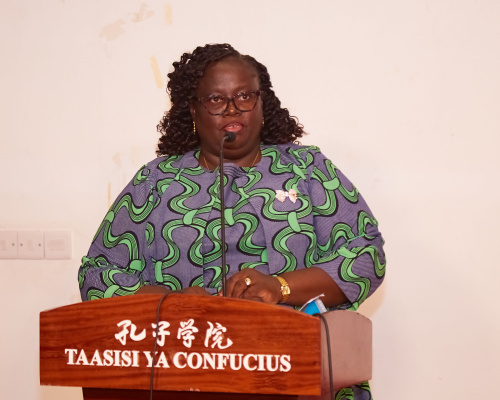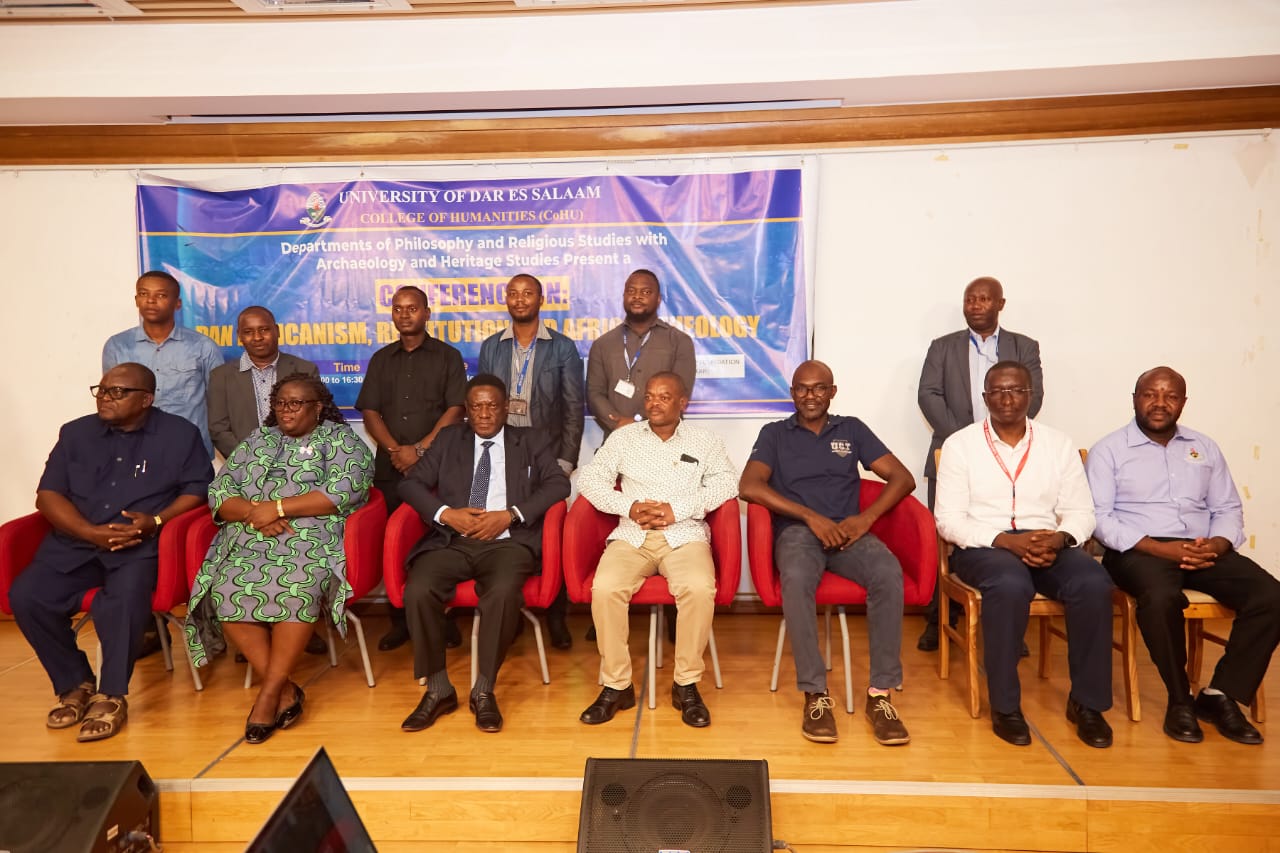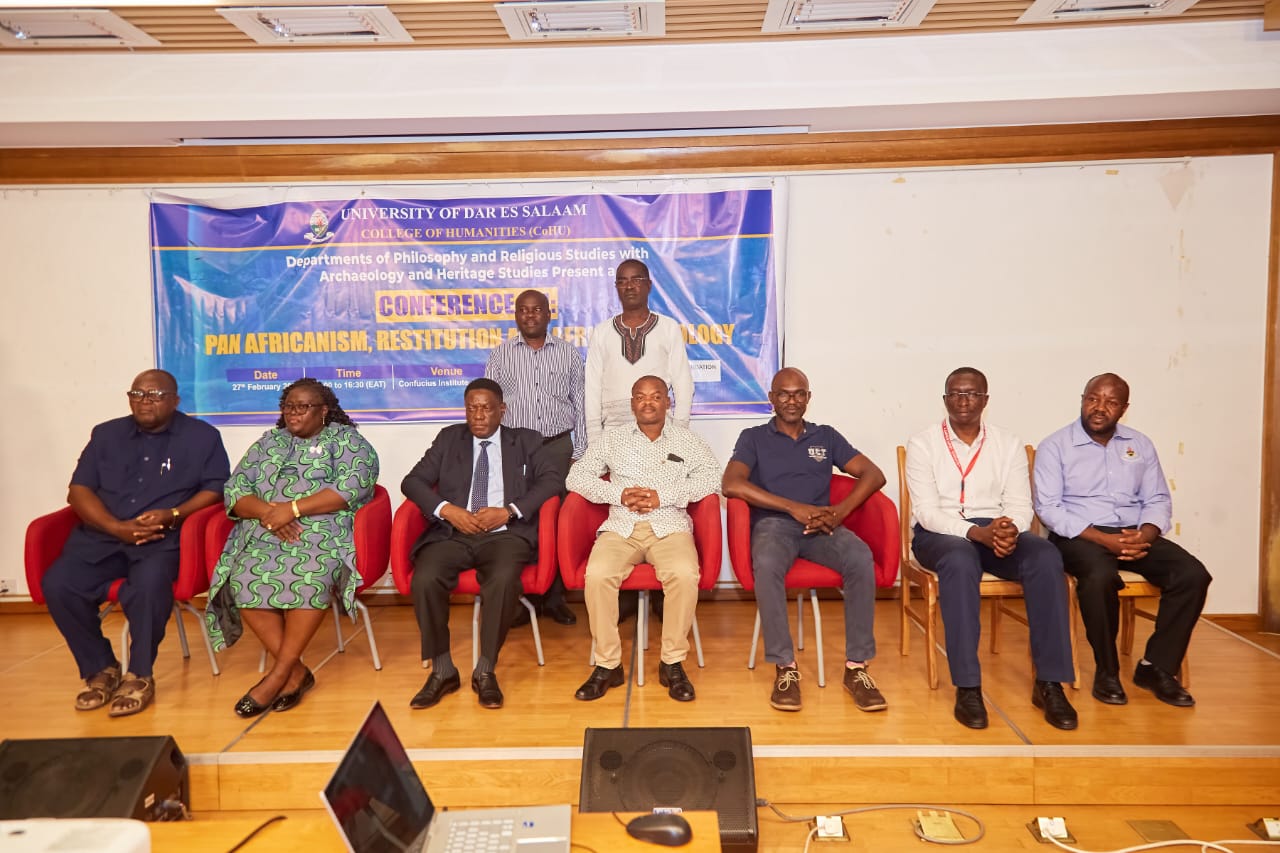College of Humanities hosts a symposium on Pan-Africanism, Restitution and African Theology
By Jackson Isdory, CMU
The College of Humanities (CoHU) at the University of Dar es Salaam has hosted a remarkable symposium “Pan-Africanism, Restitution and African Theology”, which attracted international scholars and stakeholders for critical discussions and deliberations.
With a generous sponsorship of the African Studies Association of Africa (ASAA) and the Open Society Initiative for West Africa- Dakar (OSIWA), the symposium, which was held on 27th February 2024 at the UDSM, brought together scholars from different corners of the African continent and beyond.
Speaking when gracing the symposium, the Guest of Honour, Prof. Bonaventure Rutinwa, UDSM Deputy Vice Chancellor responsible for Academic affairs, commended the organisers of this symposium and urged participants to increase the volume of research on culture and the inherent beauty of the African continent.
“This symposium not only sparks insightful scholarly discussions but also paves a way for joint research opportunities capable of restructuring the African intellectual landscape”, said Prof. Rutinwa.
Prof. Rutinwa underscored the significance of the symposium in addressing challenges and opportunities related to African unity, cultural restitution, and spirituality within the academic community.
Meanwhile, Prof. Rose Upor, Principal of the College of Humanities, was optimistic that the thoughtful reflection and exploration in the symposium would largely contribute to the upcoming publication of conference papers in high quality international journals “ensuring that these voices reverberate across the global academia”.
Beyond geographical boundaries
Participants of this historic symposium engaged in insightful discussions about the challenges and opportunities surrounding such issues of African unity, cultural restitution, and spirituality relevant to the continent beyond geographical boundaries both physically and virtually.
Participants who attended this symposium were scholars from different countries of the African continent, including Kenya, Democratic Republic of Congo, South Africa, Tanzania and Ghana.
“The symposium's hybrid format has integrated both physical and virtual attendance, which widened its scope and accessibility to a diverse audience”, said one of the participants.
Distinguished scholars shared their insights on the symposium’s critical themes, including Prof. Divine Fuh, Vice President of ASAA and Director of the Institute for Humanities in Africa (HUMA), University of Cape Town; Rev. Dr. George Macharia, SJ, Registrar of Hekima University College, Nairobi, Kenya; and Dr. Toussant Kafarhire, SJ, President of ASAA.
Others included Prof. Francis Matambalya, Executive Director of the Mwalimu Nyerere Foundation; Dr. Resani Mnata, Director of Culture, Ministry of Culture, Sports, and Art; and Prof. Mjiba Frehiwot from the Institute of African Studies, University of Ghana. Scholars from the University of Dar es Salaam included Dr. George Ambindilwe, Dr. Dominicus Zimanimoto Makukula and Prof. Pastory Bushozi.
Prof. Francis Matambalya insisted that the symposium was more than a passing intellectual meeting, and thus it should stamp a pathway for stable collaborations. “This conference has opened doors for collaborative research that transcends geographical and institutional boundaries”.
Other News
Sun, 10.Nov.2024 : UDSM na UH vyafanikisha upatikanaji wa Kamusi ya Kihispania-KiswahiliFri, 08.Nov.2024 : UDASA Bonanza 2024 picks up vibes
Fri, 01.Nov.2024 : Robotics Bootcamp attracts hundreds of young talents to UDSM, sparks passion for Physics and Technology
Wed, 30.Oct.2024 : Dr. Jackson Justo drives AI-powered energy innovations for sustainable future
Thu, 24.Oct.2024 : Partnership with NMB promises innovation, talent development and digital transformation at UDSM
Wed, 09.Oct.2024 : Economics don Dr. Innocensia John is named among 2024 top Agri-Food Pioneers
Tue, 08.Oct.2024 : School of Mines and Geosciences gears up for Helium exploration in Tanzania
Sat, 05.Oct.2024 : UDSM students excel in 2024 NGEA Award Regional Challenge





